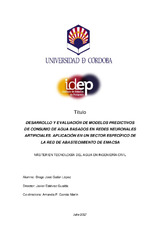Desarrollo y evaluación de modelos predictivos de consumo de agua basados en redes neuronales artificiales. Aplicación en un sector específico de la red de abastecimiento de EMACSA
Development and evaluation of predictive models of water consumption based on artificial neural networks. Application on a “EMACSA’s” specific sector of the water supply network
Autor
Galán López, Diego José
Tutor
Estévez Gualda, JavierGarcía-Marín, A.P.
Editor
Universidad de CórdobaFecha
2020Materia
Redes neuronales artificialesAnálisis de series temporales
Control de calidad
Validación
Predicción
Consumos
Aprendizaje profundo
Artificial neural networks
Analysis of time series
Quality control
Validation
Consumption
Prediction
Deep learning
METS:
Mostrar el registro METSPREMIS:
Mostrar el registro PREMISMetadatos
Mostrar el registro completo del ítemResumen
Los nuevos sistemas de gestión de recursos llevan integrado el llamado internet de las cosas, orientado hacia un modelo de “Smart cities”. En este punto, donde se genera una gran cantidad de datos, resulta crucial la necesidad de validarlos como requisito previo a su uso en las diferentes gestiones que los requieran. El presente trabajo se centra en la estimación de consumos de agua potable de la red de abastecimiento de la Empresa Municipal de Aguas de Córdoba, a través del desarrollo y evaluación de diferentes modelos predictivos basados en redes neuronales artificiales (RNA). Los modelos empleados han sido el NFIT (ajuste entradas-salida), NARX (Red Neuronal No lineal Autorregresiva con factores externos) y aprendizaje profundo (Red Neuronal Recurrente LSTM). Empleando diversas arquitecturas y evaluando diferentes sets de datos para su validación, se han calculado una serie de estadísticos para evaluar su rendimiento. En base a los resultados obtenidos, la RNA LSTM (aprendizaje profundo) mostró el mejor comportamiento a la hora de pronosticar los consumos de agua con un horizonte de una hora, para todos los contadores analizados. El NARX resultó ser más preciso que el NFIT para todos los casos, a excepción del contador de mayor calibre. The new systems of resource management have integrated the socalled Internet of Things, oriented towards a model of "Smart cities". At this point, where a large amount of data is generated, the need to validate them as a prerequisite to their use in the different procedures that require them is crucial. The present work focuses on the estimation of drinking water consumption of the supply network of “EMACSA”, through the development and evaluation of different predictive models based on artificial neural networks (ANN). The models used were the NFIT (input-output adjustment), NARX (Neural Line Non-linear Autoregressive with external factors) and deep learning (Recurrent Neural Network LSTM). Using various architectures and evaluating different sets of data for validation, a series of statistics have been calculated to evaluate their performance. Based on the results obtained, the LSTM RNA (deep learning) showed the best behaviour when forecasting the consumption of water with a horizon of one hour, for all the meters analyzed. The NARX proved to be more accurate than the NFIT for all cases, with the exception of the higher caliber counter.
Descripción
Premio extraordinario de Trabajo Fin de Máster curso 2017/2018. Máster en Tecnología del Agua en Ingeniería Civil

